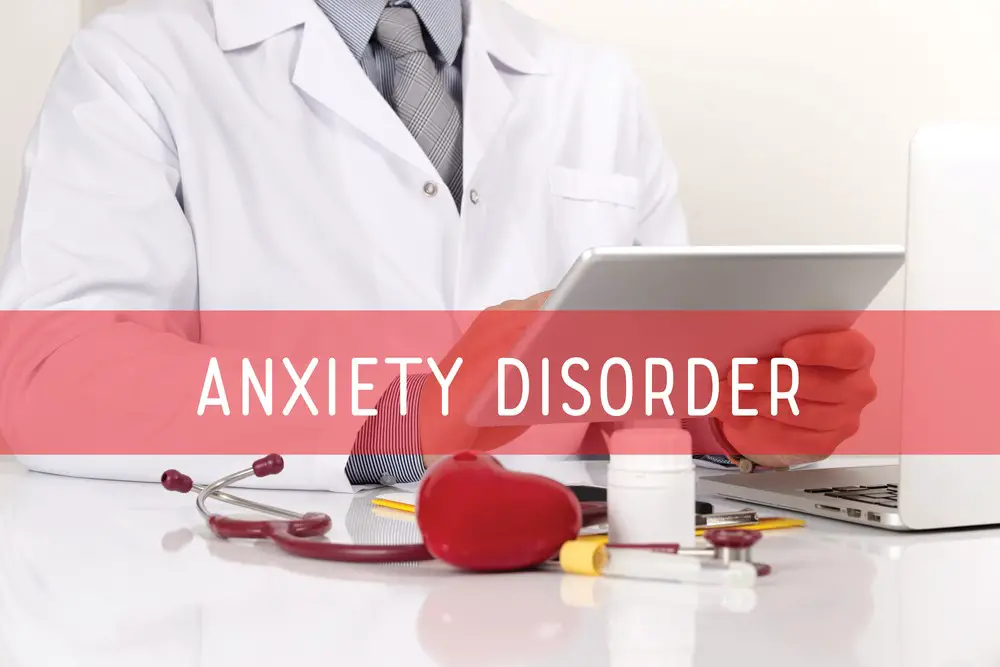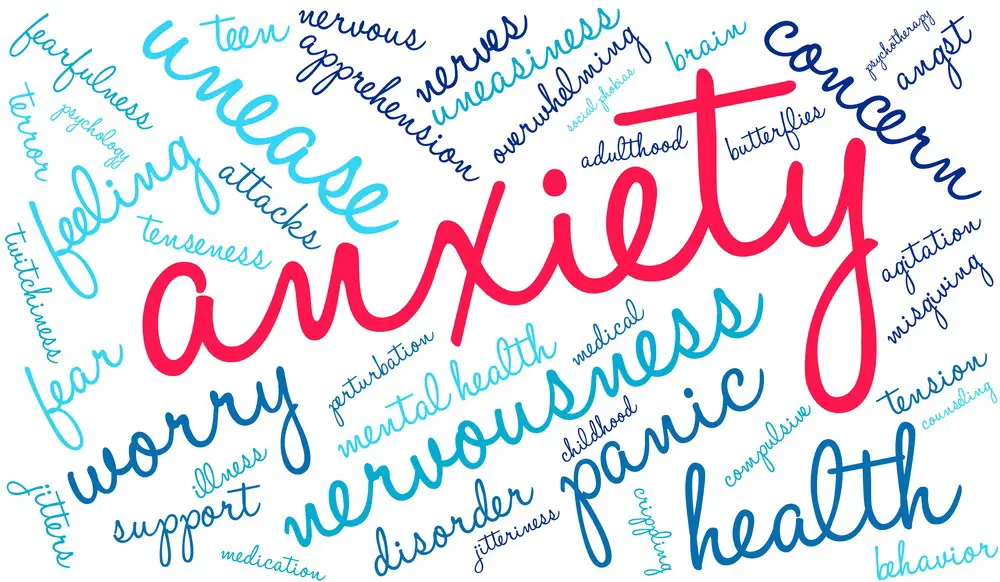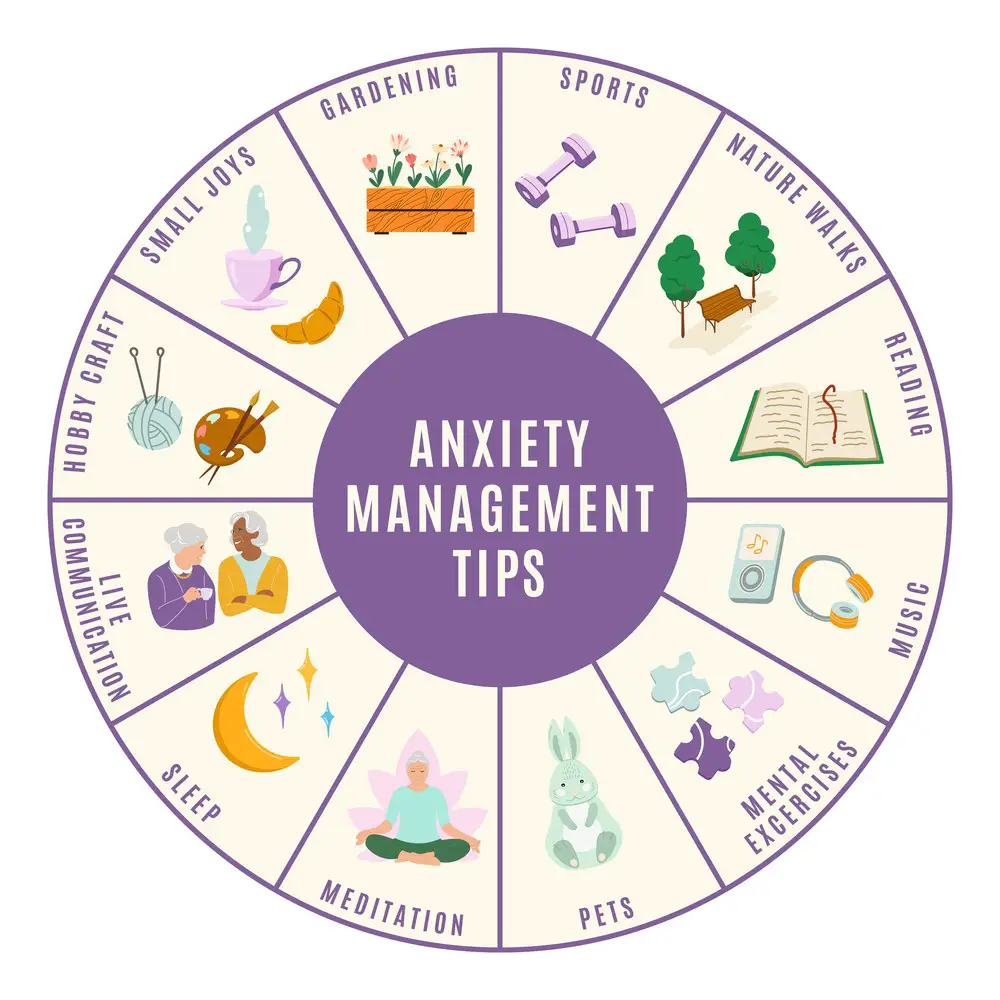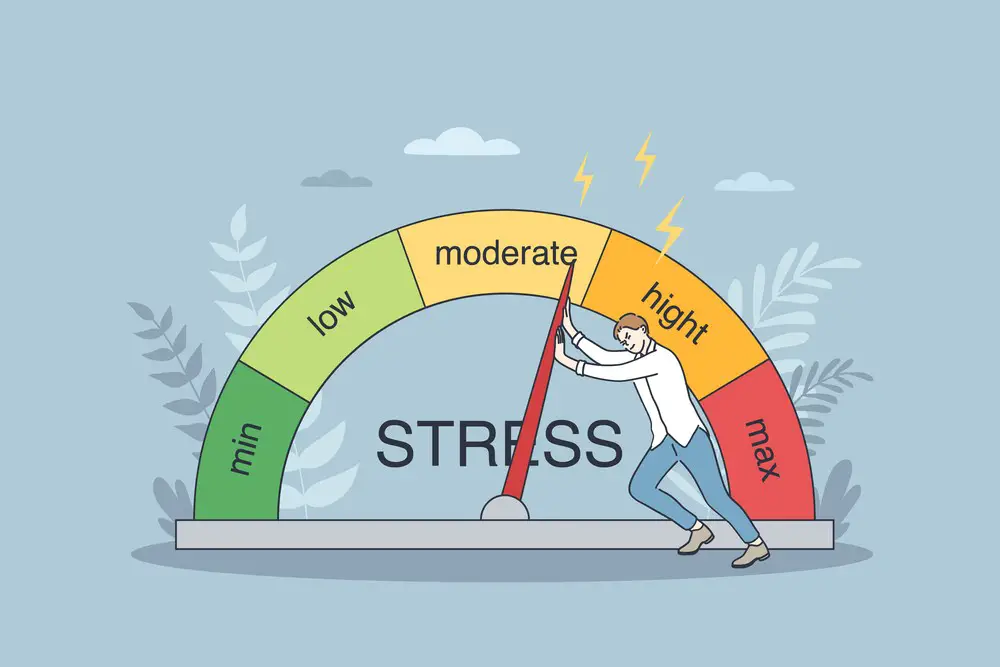As a BetterHelp affiliate, we receive compensation from BetterHelp if you purchase products or services through the links provided
Dealing with social anxiety at work can be daunting, especially when your daily routine involves interacting with colleagues and participating in meetings. It’s not uncommon for individuals to feel nervous, shy, or even fearful in certain social situations. However, when these feelings become persistent and overwhelming, finding effective strategies to cope and thrive in the workplace is essential.
Understanding your social anxiety is the first step to overcoming the hurdles it presents. By identifying the triggers and situations that cause discomfort, you can begin to take control and develop techniques to manage anxiety symptoms. Building confidence, enhancing communication skills, and seeking support from friends, colleagues, and professionals is crucial. Healthy practices and self-help techniques may help alleviate social anxiety and improve mental well-being.
Key Takeaways
- Identify triggers and situations that cause discomfort to manage social anxiety at work.
- Build confidence and improve communication skills alongside seeking support from friends, colleagues, and professionals.
- Adopt self-help techniques and maintain healthy practices to alleviate anxiety and enhance mental well-being.
 Understanding Social Anxiety at Work
Understanding Social Anxiety at Work
Social anxiety disorder, or anxiety disorder, is a mental health condition that can significantly impact your day-to-day life, including your experiences at work. This anxiety disorder manifests as excessive nervousness, fear, and self-consciousness in social situations. It’s crucial to identify the symptoms of social anxiety and address them with appropriate strategies to maintain your mental health.
Firstly, it’s important to recognize the physical symptoms that may arise due to workplace anxiety. These can include increased heart rate, sweating, trembling, difficulty speaking, and dizziness. Knowing these physical indicators can help you pinpoint when social anxiety affects you at work.
A clear understanding of the mental health aspects of social anxiety is also essential. This disorder goes beyond feeling nervous – it can cause intense dread or fear of being judged, criticized, or rejected by others. These thoughts can cripple your performance at work and hinder you from building strong professional relationships.
Learning coping strategies and techniques that reduce these negative emotions helps manage your social anxiety at work. Some simple methods might include deep breathing exercises, progressive muscle relaxation, or visualizing a calm and safe environment. Practicing these techniques consistently can help alleviate your anxiety and make you feel more comfortable in the workplace.
Developing a support network at your workplace is another way to navigate social anxiety. Reach out to your colleagues, supervisors, or even a trusted mentor. Sharing your concerns can help others understand your struggles and create opportunities for them to provide encouragement and assistance.
Lastly, seeking a professional diagnosis and appropriate treatment for your anxiety disorder is paramount. A mental health professional can help you better understand your condition, recommend specialized strategies or treatments, and provide ongoing support to ensure a healthy work-life balance.
Understanding social anxiety at work and implementing appropriate strategies, you will be better equipped to overcome this mental health condition and thrive professionally. Strengthening your mental health and addressing the challenges posed by social anxiety will ultimately lead to improved workplace experiences and overall well-being.
 Identifying Triggers of Social Anxiety
Identifying Triggers of Social Anxiety
Dealing with social anxiety at work starts with recognizing your triggers. By knowing what situations make you feel anxious, you can better prepare and manage your stress. Here are some of the most common triggers of social anxiety at the workplace:
Meetings and performances – Whether it’s a team meeting or performance review, these situations can provoke anxiety due to the fear of being judged or criticized. Feeling pressure to speak up during meetings or needing to perform well in front of others can be overwhelming.
Social situations – Interacting with coworkers during lunch breaks or after-work events can be stressful, especially if you worry about saying the wrong thing or being awkward. Identify which aspects of these interactions cause your anxiety, such as making small talk or maintaining eye contact.
Public speaking and presentations – Giving a speech or presenting your work to a group can be a common trigger for social anxiety. The pressure to be engaging and informative and the fear of negative feedback can significantly raise stress levels.
Email communication – For some, composing an email or replying to a work-related message can trigger anxiety. Concerns about tone, grammar, or potential misinterpretation can lead to excessive drafting and editing, ultimately causing distress.
Team dynamics – Working closely with a group of colleagues can spark social anxiety when facing decisions that require negotiation or collaboration. Fears of appearing incompetent or being excluded from the team can contribute to job anxiety.
Work performance and job performance – Concerns about not meeting expectations or facing negative consequences due to poor performance can exacerbate social anxiety. This can manifest in feelings of insecurity, procrastination, or perfectionism.
Once you’ve identified your triggers, you can develop coping strategies for your social anxiety at work. This might involve deep breathing exercises, visualization techniques, or seeking support from coworkers or a mental health professional.
Managing Social Anxiety Symptoms
 Physical Coping Strategies
Physical Coping Strategies
To manage stress and tension in your body, try incorporating some physical coping strategies:
- Practice deep breathing exercises: Taking slow, deep breaths can help alleviate anxiety symptoms. When you feel anxious, pause and inhale deeply through your nose, hold your breath for a few seconds, and exhale through your mouth. Repeat a few times until your stress levels decrease.
- Engage in physical exercise: Exercise is known to help reduce anxiety and promote relaxation. Schedule time for regular physical activities, such as jogging, cycling, or yoga, to help you relieve tension and feel refreshed.
- Ground yourself: If you experience dizziness or feel disconnected from your surroundings, grounding techniques can help. Focus on physical sensations, such as your feet touching the ground or the chair supporting your weight.
Mental Coping Strategies
When confronted with anxious thoughts, create a mental space that promotes calmness and happiness:
- Challenge negative thoughts: Identify and replace negative thoughts with more positive or realistic alternatives. Remind yourself of past successes and focus on your strengths.
- Practice active listening: Allow yourself to engage in conversations rather than dwell on your anxiety. Respond to what others say and ask questions to demonstrate your interest.
- Relaxation and visualization: Visualize yourself in a comfortable and happy environment. Imagine the sights, sounds, and smells, allowing your mind to experience a sense of peace and tranquility.
By incorporating these coping strategies, you’ll be better equipped to manage social anxiety symptoms at work, enhancing your overall well-being and productivity.
 Seeking Professional Assistance
Seeking Professional Assistance
Social anxiety can be challenging to manage independently, especially in the workplace. This is why seeking professional assistance can make a significant difference. A trained therapist can help you overcome your persistent fear and ease your social phobia.
Reaching out to a mental health professional, such as a therapist or a counselor, is an important step toward understanding and addressing your social anxiety. They can offer valuable guidance on approaching difficult situations at work and provide you with coping strategies to reduce your anxiety levels. Remember, seeking help is a sign of strength, not weakness.
Participating in therapy sessions can greatly improve your mental health and equip you with the tools to navigate the workplace more comfortably. Cognitive-behavioral therapy (CBT) is a popular and proven method for tackling social phobia. CBT focuses on identifying and transforming negative thought patterns and behaviors to help you face social situations more confidently.
In addition to traditional therapy, you might explore support groups for individuals with social anxiety. Conversations with others who share your experiences can offer valuable insights and encouragement. Knowing that you aren’t alone in your struggles can boost your self-assurance and empower you to work towards overcoming your anxiety.
Lastly, being patient with yourself as you embark on this journey is essential. Overcoming social anxiety takes time and effort, and it’s crucial to celebrate your progress along the way. As you work with a therapist and immerse yourself in supportive environments, you’ll be better equipped to handle social situations and enjoy a more balanced and fulfilling work life.
Building Confidence and Social Skills
Dealing with social anxiety at work might seem overwhelming, but confidence and improved social skills can go a long way in helping you feel more at ease in social situations. The good news is that confidence and social skills can be developed over time. Here are some helpful strategies to build your confidence and social skills.
Practice makes perfect: One of the best ways to gain confidence is through practice. Gradually expose yourself to social situations that challenge your anxiety in manageable steps. Attend work meetings, talk with colleagues, and participate in team-building activities. As you gain experience, your confidence will naturally grow.
Work on your communication skills: Effective communication is key in social interaction. Pay attention to your body language, maintain eye contact, and practice active listening. By focusing on these essential social skills, you can make a better impression on your coworkers and feel more connected to them.
Replace avoidance with a proactive approach: Do not let shyness or fear dictate your actions at work. Instead, make a conscious effort to step out of your comfort zone and engage with others. Not only will this help build your confidence, but it can also prevent you from feeling isolated or left out.
Seek professional development opportunities: Participating in leadership training or attending workshops designed to enhance social skills can provide invaluable tools for managing social anxiety. These activities can improve your performance at work and support your personal growth regarding confidence and social abilities.
Combat your inner critic: Remember that nobody is perfect, and feeling nervous or unsure in some social situations is normal. Recognize when your inner critic is holding you back and replace negative thoughts with positive, affirming self-talk.
Request accommodations when necessary: If your social anxiety affects your work performance, don’t hesitate to talk to your supervisor about possible accommodations. They might provide options such as adjusting your workload or collaborating with colleagues in a less intimidating environment.
By consistently practicing these strategies, you will gradually develop your confidence and improve your social skills. This will lead to a more comfortable and enjoyable workplace experience, even for those with social anxiety.
 Workplace Accommodations and Support
Workplace Accommodations and Support
Dealing with social anxiety at work can be challenging, but you’re not alone. Many Americans experience similar feelings, and luckily, accommodations and support systems are available to help you manage your anxiety.
First, have an open conversation with your supervisor to discuss your needs. They need to understand your situation to guide you in finding the right solutions. You may feel more comfortable if you establish clear expectations and prioritize your tasks. This sense of control will help reduce your anxiety.
Consider the following accommodations to help manage your social anxiety at work:
- Flexible work schedule: Adjusting your hours or working remotely when needed can alleviate stress and anxiety.
- Break spaces: A quiet area where you can take breaks and have some personal time can contribute to a more relaxed work environment.
- Communication methods: Explore alternative communication methods, like email or instant messaging, to minimize face-to-face interactions when you’re uncomfortable.
In addition to accommodations, a support system can be beneficial in managing social anxiety:
- Therapy or counseling: Speak with a mental health professional to gain insight into your anxiety and develop coping strategies.
- Support groups: Connecting with others with similar experiences can provide encouragement and helpful advice.
- Self-care activities: Focus on activities outside of work that help you relax and recharge, such as meditation, exercise, or spending time with loved ones.
Remember, your well-being and comfort are essential factors for a successful career. By implementing workplace accommodations and seeking support, you’ll be better equipped to manage social anxiety professionally.

Self-Help Techniques and Healthy Practices
Feeling anxious in social situations at work is quite common. Fortunately, various self-help techniques and healthy practices can help you cope with social anxiety. Remember, it’s important to find the best strategies for you.
Stress management plays a crucial role in alleviating social anxiety. When you’re under stress, your anxiety levels can increase. Consider finding simple techniques such as deep breathing exercises, taking short breaks, or engaging in physical activities like walking during work. Developing healthy habits to manage stress can help lower your anxiety in social situations at work.
Mindfulness is another powerful tool to help you manage social anxiety. By being present and aware of your thoughts and feelings, you can train your mind to recognize anxiety-triggering thoughts and respond to them more calmly. Incorporate mindfulness practices such as meditation or breathing exercises into your daily routine to improve self-awareness and emotional resilience.
Maintaining a healthy lifestyle can greatly impact your ability to manage social anxiety. Cutting back on alcohol consumption, eating a balanced diet, exercising regularly, and getting enough sleep will help to keep your mind and body in optimal condition. A healthy lifestyle primes you to handle anxiety and stressful situations better.
Self-help resources like books, courses, and online communities can also provide valuable insights and coping strategies for dealing with social anxiety. These resources often share personal experiences from others who have successfully overcome or managed their social anxiety.
Coping strategies to help you manage social anxiety at work include breaking down situations into smaller, manageable steps, focusing on your accomplishments, and setting realistic goals. These strategies aim to help you control your anxiety and build confidence in your ability to handle challenging situations.
Finally, don’t underestimate the power of music to ease anxiety. Listening to calming or uplifting tunes during breaks or while working can help create a soothing atmosphere and lower stress levels.
Incorporate these self-help techniques and healthy practices into your daily life to effectively manage social anxiety at work. Wishing you success and growth on your journey!

Using Medication and Treatment
Dealing with a social anxiety disorder at work can be challenging, but fortunately, treatments and medications can help you manage it effectively. You may consider combining medication and therapy to better cope with your social anxiety.
Medication Options
Regarding medications for social anxiety, the most commonly prescribed are selective serotonin reuptake inhibitors (SSRIs) such as Prozac, Zoloft, and Paxil. These medicines can help regulate your mood and reduce anxiety symptoms by enhancing serotonin levels in the brain.
Another type of medication for social anxiety is benzodiazepines like Xanax and Valium. These drugs can quickly relieve severe anxiety but should be used cautiously, as they can be habit-forming.
Beta-blockers, like Inderal and Tenormin, can be prescribed to help people cope with specific anxiety-inducing situations, such as public speaking or presentations. These drugs block adrenaline and reduce physical anxiety symptoms like a racing heart and trembling hands.
Professional Therapy
In addition to medication, professional therapy can play a significant role in managing your social anxiety disorder. One of the most effective techniques is cognitive-behavioral therapy (CBT), which helps you identify and modify negative thought patterns and beliefs contributing to your anxiety. With the guidance of a trained therapist, you will find new ways of responding and coping with social situations, eventually reducing your anxiety.
Group therapy and support groups can also be helpful, as they allow you to connect with others who experience similar anxiety issues. Sharing experiences and tips with your peers can provide encouragement and insight into dealing with your social anxiety disorder.
Remember that finding the right medication and treatment plan may take some time and trial and error since everyone’s experience with social anxiety is different. Be patient and check regularly with your doctor and therapist to evaluate your progress and adjust your treatment plan as needed. Remember that medication and therapy help you manage your social anxiety and make you feel more comfortable and confident in the workplace.
 Overcoming the Invisible Hurdles: Social Anxiety in the Workplace and When to Seek Professional Help
Overcoming the Invisible Hurdles: Social Anxiety in the Workplace and When to Seek Professional Help
Social anxiety at work can manifest in many ways and may seriously impact one’s career progression and daily life. While coping strategies may be effective for some, there are situations where professional therapy is not only beneficial but necessary. Here’s when it might be time to seek help from a mental health professional:
- Persistent and Intense Anxiety: A therapist can provide tailored strategies to manage these reactions if social interactions consistently provoke intense fear or anxiety disproportionate to the situation.
- Interference with Daily Functioning: When anxiety impedes your ability to perform your job, interact with colleagues, or attend necessary meetings, professional help can guide you through these barriers.
- Avoidance Behavior: If you find yourself avoiding social situations, even those crucial for your job, to the point where it affects your work performance, seeking professional assistance can help you overcome this avoidance.
- Physical Symptoms: Anxiety isn’t just mental; it can manifest physically too. A therapist can teach you coping mechanisms if you experience excessive sweating, trembling, or nausea before or during social situations at work.
- When Self-Help Isn’t Enough: If books, online resources, or support from friends and family aren’t alleviating your anxiety, a mental health professional can provide specialized, evidence-based treatment tailored to your needs.
- Development of Additional Mental Health Issues: Social anxiety can lead to other mental health problems, such as depression. If you notice symptoms of other mental health conditions, it’s vital to seek professional help immediately.
- Desire for Professional Insight and Strategies: Sometimes, the decision to seek therapy comes from understanding your anxiety’s underlying causes and gaining professional insight and strategies to manage it more effectively.
Professional therapists are trained to help you understand why social situations make you anxious and teach you coping strategies. If you recognize any of the above signs, reaching out to a mental health professional could be the essential step toward thriving in your workplace, free from the constraints of social anxiety.
Frequently Asked Questions

How can I cope with workplace events when I have social anxiety?
You can prepare for workplace events by setting realistic expectations and focusing on small goals. Break the event into smaller parts, such as conversing with one person or finding someone you know. Taking breaks when needed is okay; step outside if you’re feeling overwhelmed. Practice deep breathing techniques before the event to help keep yourself calm.
What strategies can help me calm down when experiencing social anxiety on the job?
When you feel social anxiety at work, first acknowledge it and try to understand its triggers. Utilize deep breathing exercises or grounding techniques to regain control. Keep a list of mental or physical activities that soothe you, such as a short walk or listening to calming music. Implementing these strategies can help you manage overwhelming emotions and regain focus on your work.
Is it common to struggle with social anxiety in professional settings?
Yes, it’s quite common for people to experience social anxiety in professional settings. It’s important to remember you’re not alone in this struggle, and many individuals face similar challenges. Seeking support from a therapist or support group is a great way to help you cope with social anxiety and connect with others who share your experiences.
How do I communicate my social anxiety to my employer?
When discussing social anxiety with your employer, focus on situations that cause you distress and suggest possible accommodations to make the workplace more comfortable. Be honest and open about your condition while maintaining a professional tone. Your employer might not know your struggle, so it’s crucial to communicate your needs and be open to collaboration.
Which techniques can aid in managing social anxiety around my coworkers?
Developing self-awareness and understanding your triggers can be the first step in managing social anxiety around coworkers. Utilize techniques like deep breathing exercises, grounding methods, and visualizing successful interactions to build confidence. Don’t be afraid to practice social skills, such as active listening and making eye contact, as doing so can strengthen your ability to interact with others.
How does one handle anxiety triggered by a specific colleague?
Addressing anxiety triggered by a specific colleague can be approached from multiple angles. First, reflect on what about that colleague causes your anxiety and consider if it’s something that can be resolved through a conversation. If the anxiety is primarily rooted in social anxiety, work on coping mechanisms, such as deep breathing and visualization exercises, to manage your feelings. Maintaining open communication and setting boundaries can also effectively reduce anxiety linked to that colleague.
About the Author: Jacob Maslow – Navigating Mental Health and Co-Parenting Challenges
I’m Jacob Maslow, a writer, mental health advocate, and therapy veteran. My journey through mental health challenges has shaped who I am today and inspired my commitment to supporting others. Taking Lexapro has been a part of my strategy to manage my mental well-being, but I also find solace in my daily long walks, where I clear my head and rejuvenate my spirit.
Life hasn’t always been easy. My ex-partner’s severe narcissism led to a heartbreaking situation where she completely alienated our kids, refusing to comply with court-ordered shared custody. Despite our previously close relationship, I’ve endured a relentless court battle for years, struggling to maintain communication with my two minor children. The consistent breaking of court orders adds to the complexity and pain of the situation.
Through these personal struggles, I’ve discovered a passion for writing articles on mental health and narcissism. I aim to reach those with similar challenges, providing insight, encouragement, and affirmation that anyone can overcome their mental health issues. Additionally, I run a legal site designed to assist others who face spouses who refuse to comply with court orders, turning children into weapons rather than co-parenting.
As someone who has faced the dual challenges of mental health management and legal battles over custody, I believe my experiences add unique depth and authenticity to my writings. Whether it’s strategies to deal with social anxiety at work or guidance on handling a narcissistic partner, I aim to empower others with the tools and support they need to thrive.
- 7 Ideas to Help You Relax and Unwind on a Family Vacation - April 27, 2025
- How Having Cybersecurity Protection Helps You Relax - April 25, 2025
- 8 Reasons Why Spending Time Outside Calms You Down - April 25, 2025
This site contains affiliate links to products. We will receive a commission for purchases made through these links.


 Understanding Social Anxiety at Work
Understanding Social Anxiety at Work Identifying Triggers of Social Anxiety
Identifying Triggers of Social Anxiety Physical Coping Strategies
Physical Coping Strategies Seeking Professional Assistance
Seeking Professional Assistance Workplace Accommodations and Support
Workplace Accommodations and Support Overcoming the Invisible Hurdles: Social Anxiety in the Workplace and When to Seek Professional Help
Overcoming the Invisible Hurdles: Social Anxiety in the Workplace and When to Seek Professional Help
